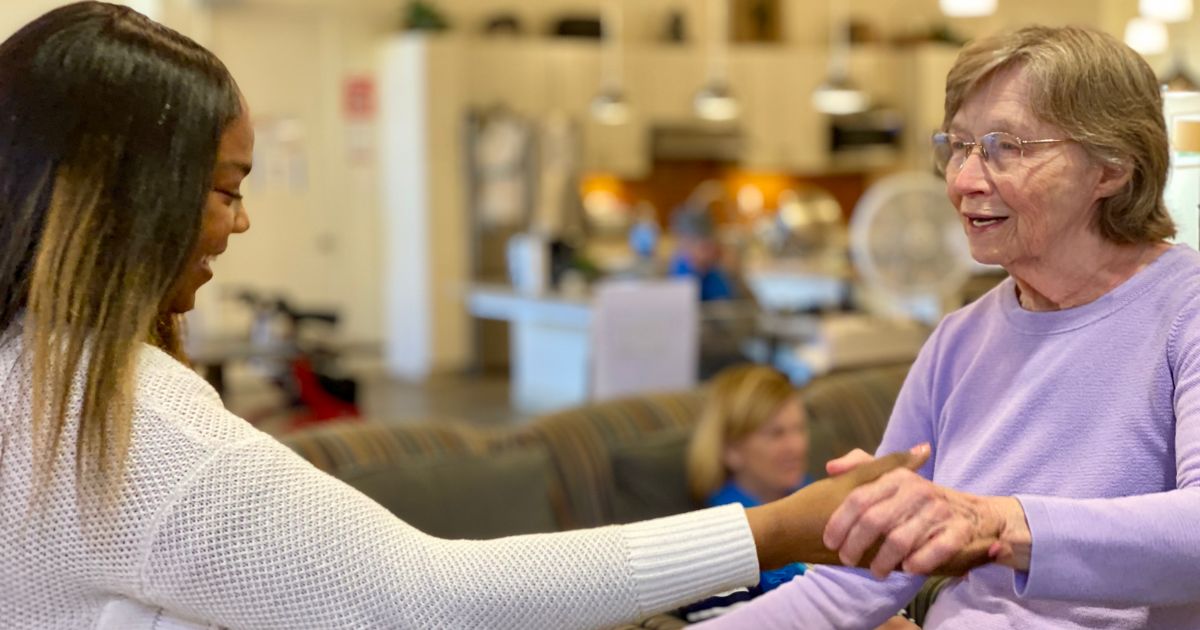In-home care can be a great option for seniors who wish to age in place in the comfort of their own homes. Home care, like Abe’s Garden at Home, provides personalized services to meet the needs of older adults so they can remain independent and maintain their dignity at home. Learn four ways at-home care empowers seniors to thrive in their own homes with customized care in this blog from Abe’s Garden at Home.
4 ways at-home care for seniors promotes more independence
1. Personalized and flexible at-home care for seniors
Caregivers can tailor their services to match the unique needs, preferences, and routines of each individual. At-home care is also flexible in the timing of services and for any changing needs older adults may face.
Whether it’s assistance with daily living activities such as bathing, dressing, and meal preparation, or help with medication management and mobility, at-home team members ensure senior clients receive the right level of support, not too little, not too much. This balance gives older adults the confidence to remain active and self-reliant, knowing that assistance is available whenever needed.
2. Comfort of familiar surroundings
One of the most significant advantages of in-home care is the ability for seniors to stay in their own homes, surrounded by memories and familiarity. There is an inherent comfort and sense of security in living within your own space. This type of setting allows seniors to maintain their routines and continue living life on their terms, which are essential aspects of independence and dignity.
Remaining at home also means seniors can stay close to their community, friends, and family, maintaining social connections that may be lost when moving to a senior living community. Local shops, parks, and community centers may also encourage older adults to stay engaged and active.
3. Empowerment through choice and control of home care services
Choice and control are key to fulfilling our sense of dignity and autonomy. At-home care respects a senior’s independence by allowing them to make choices about their care and daily activities. Seniors can decide when to wake up, what to eat, and how to spend their day.
Additionally, older adults with in-home care can be involved in choosing their caregiver, which can lead to a more personal and trusting relationship. This sense of control can improve a senior’s emotional well-being knowing they have a say in their own care and are not being excluded from decisions that affect their lives.
4. Intentional companionship and engagement
At-home care does more than help with physical needs; it can also be instrumental in promoting mental health. With our unique I’m Still Here® approach, seniors with Alzheimer’s or other dementias are less likely to experience feelings of isolation and depression.
At-home caregivers can encourage participation in stimulating activities, hobbies, and exercise appropriate for their age and physical condition, all of which contribute to healthier, happier living. By supporting a senior’s ability to engage in activities that bring joy and maintain cognitive function, caregivers are directly enabling their independence and a higher quality of life. At-home care ensures that dignity is not compromised by physical or mental health challenges.
Ensuring a compassionate approach to aging
At-home care is much more than a service; it’s a means of empowering seniors to live life with the independence and dignity they deserve. Through personalized support, maintenance of familiar surroundings, empowerment in decision-making, and promotion of overall well-being, at-home care offers a compassionate approach to aging.
Are you ready to explore in-home care?
Download our free guide, “Compassionate Support from the Comfort of Home: A Guide to Abe’s Garden at Home,” to help you understand the options available to you and your loved one. You’ll learn about our approach, the benefits of in-home care, our service offerings, and how to get started.

